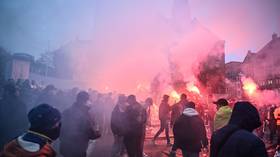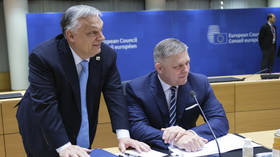G20 pledge $1 trillion to boost world economy
Despite a number of earlier disagreements, G20 leaders seem to have finally reached a consensus and pledged over one trillion dollars to the IMF and the World Bank to stimulate the global economy.
Under the terms of the deal, the International Monetary Fund will get extra resources worth $750 billion, which would triple the size of the fund. There is also a pledge to clamp down on tax havens and freewheeling hedge funds.
In total, $US 5 trillion will be allocated by the end of 2010 by G20 to tackle the crisis.
The Group of 20 industrial and developing nations, who gathered for a summit at London's ExCel centre, want the extra cash to boost liquidity and help economies hit worst by the world economic crisis.
Britain’s Prime Minister Gordon Brown, speaking at a media conference after the summit, said:
"Today the world's largest nations have agreed a global plan for recovery and reform. This involves the biggest interest rate cuts in history, the biggest fiscal stimulus we’ve ever seen, the biggest increase of resources in the history of our international institutions.”
Gordon Brown said he believes “a new world order is emerging.”
“We’ve resolved that from today we’ll together manage the process of globalization to secure responsibility from all and fairness to all. And we’ve agreed that in doing so we will build a more sustainable and more open and a fairer global society,” he said.
Gordon Brown said the measures would slow down the recession and provide jobs, adding that G20 leaders had agreed "to meet again later this year."
The leaders have also agreed on banking reform and the reform of lending institutions. In the final communiqué they also pledged ‘to strengthen financial regulation to rebuild trust’.
“By acting together to fulfill these pledges we will bring the world economy out of recession and prevent a crisis like this from recurring in the future,” their statement reads.
End of crisis?
Even though it was not easy to find common language, now it seems that most of the summit participants are satisfied with its outcome.
French President Nicolas Sarkozy, who had promised to storm out if he didn’t have his way, said the results of the London gathering were "beyond his expectations."
German Chancellor Angela Merkel said a ‘new financial architecture’ is emerging.
Gordon Brown said, “We believe that growth, to be sustained, must be shared, and that trade must once again become an engine of growth. The old Washington consensus is over; today we have reached a new consensus."
Speaking at a media conference in London Russia’s President Dmitry Medvedev said that the outcome of the meeting is definitely a step forward, but it’s far from the end of the world financial crisis.
“I’d very much like to tell you that we’ve seen some breakthrough decisions here, but to be totally honest, this is not true. We’ve discussed a lot of problems, but the fact is no one knows the exact rules and laws with which this crisis develops,” he said.
“The steps which we’ve agreed upon today will not be able to drastically change the situation,” he added.
”What we are doing at the moment is fixing the holes in the financial system and the world economy as a whole. The way out of this crisis will take longer than we’d like it to,” Medvedev said.
However, the President added it was a positive sign that 20 nations with different mentalities and historical traditions have been able to gather together to discuss the ways to cope with the crisis.
There was also place for a bit of friendly laughter at the summit.
When the world leaders gathered for a family photo, Angela Merkel noticed that her neighbor was missing – Canadian Prime Minister Stephen Harper. She alerted the entire group, but they still had to take the photo without him. However, after the plenary session they came together for another photo, and this time the Canadian Prime Minister was the center of attention.
But the person everyone wanted to have a talk with was the new US President, Barack Obama – and Brazilian leader, Luiz Inacio Lula da Silva, even dragged Obama over to his chair to have a chat with him.












